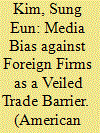| Srl | Item |
| 1 |
ID:
192840


|
|
|
| 2 |
ID:
162221


|
|
|
|
|
| Summary/Abstract |
While the rules of international trade regimes prevent governments from employing protectionist instruments, governments continue to seek out veiled means of supporting their national industries. This article argues that the news media can serve as one channel for governments to favor domestic industries. Focusing on media coverage of auto recalls in China, I reveal a systematic bias against foreign automakers in those newspapers under strict government control. I further analyze subnational reporting patterns, exploiting variation in the level of regional government interest in the automobile industry. The analysis suggests that the media’s home bias is driven by the government’s protectionist interests but rules out the alternative hypothesis that home bias simply reflects the nationalist sentiment of readers. I show that this home bias in news coverage has meaningful impact on actual consumer behavior, combining automobile sales data and information on recall-related web searches.
|
|
|
|
|
|
|
|
|
|
|
|
|
|
|
|
| 3 |
ID:
177781


|
|
|
|
|
| Summary/Abstract |
In response to President Trump instigating conflict over trade with China, the Chinese government countered by issuing tariffs on thousands of products worth over USD 110 billion in US exports. We explore whether China's tariffs reflected a strategy to apply counterpressure by hurting political support for the president's party. We also assess the strategy's impact on the 2018 midterm elections and examine the mechanism underlying the resulting electoral shift. We find strong evidence that Chinese tariffs systematically targeted US goods that had production concentrated in Republican-supporting counties, particularly when located in closely contested Congressional districts. This apparent strategy was successful: targeted areas were more likely to turn against Republican candidates. Using data on campaign communications, local search patterns online, and an original national survey, we find evidence that voters residing in areas affected by the tariffs were more likely to learn about the trade war, recognize its adverse impact, and assign the Republicans responsibility for the escalating dispute. These findings demonstrate how domestic political institutions can be a source of vulnerability in interstate disputes.
|
|
|
|
|
|
|
|
|
|
|
|
|
|
|
|